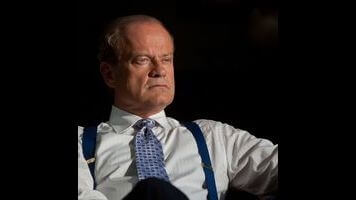Boss suffers from an identity crisis. There are times it wants to be a heavy, serious drama; there are times it wants to be a bodice-ripping thriller. That’s an interesting enough tension, and one that I’ve written about already as this season has unfolded.
But what Boss struggles with most is being entertaining. The show’s self-definition is caught up somewhere between trying to appeal to the late-night Starz audience and trying to be Emmy-baiting highbrow fare. Left behind is that most crucial element of good television: drawing in the viewer.
Although it’s possible to analyze the characters from week to week, and to admire their carefully constructed (if, at times, vague) arcs, the series lacks the kind of warmth or animation that would draw in an audience. Compare Boss to, say, Breaking Bad. Walter White’s personality has been revealed to be as equally monstrous as Tom Kane’s over the course of that show. Its pacing is also slow. The production takes creative liberties that are, at times, confusing or unclear—at least at first. But despite being bleak, Breaking Bad is also deeply funny; when it’s not funny, it’s endearing, like when Jesse or Hank does something boneheaded-but-adorable. The dark side of humanity is balanced out by its lighter side.
Boss has difficulty with the lighter side. Typically the bleak outlook on humanity weighs down the entire episode, giving the sense of a plot grinding slowly toward inevitable doom and destruction. The show’s theme song (“Satan, your kingdom must come down”) and a few of the recent episodes have leaned hard on Biblical references, and unfortunately, that rings true: Boss has all the verve of a doomsday cult.
“Redemption” stays with that theme, centering around Kane’s attempts to create a family around himself, and his typical game: manipulating everyone around him. I’d like to optimistically conclude that the episode’s title truly applies to Kitty O’Neill, who is more or less trying to redeem herself, and perhaps also tangentially to Mona Fredricks, who gets the backstory treatment this week.
(Side rant: Why does Boss hate backstory? For some reason we are expected to trundle along, blithely accepting of many characters’ weird affectations without getting any explanation for why they are the way they are. Chief examples: Emma Kane’s bizarre life story, which somehow delivered her to the priesthood via rehab and disownment from her parents; also, the Kanes’ marriage, which presumably didn’t start as twisted as it has ended up. Receiving the backstory for Mona in “Redemption” makes for a strong subplot, in which we finally get to see the Lenox Gardens that everyone has been fighting about, and learn about her relationship both to the public-housing development and to local politics. Seeing the development onscreen also brings home the dire straits of those who lived there. Boss’ expensive production values mean that the sets and atmospheres are almost always pitch-perfect; Lenox Gardens is no exception.)
The high point of “Redemption” involves Sam Miller kissing Kitty by the river—not because they’re a great pairing, but because it’s exactly the soapy subplot that this show excels at. (Although, now that Sam is involved romantically I like him a whole lot more. What can I say? I’m a shipper to the end.) Boss’ first season had a lot of issues, but it was always on stabler ground when it played around with Darius and Emma and with Kitty and Ben Zajac. An interesting element of “Redemption” is that everyone, including the audience, is unsure if Kitty is actually back in the game. She displays an odd amount of softness to Kane, and capitulates to Maggie Zajac in a negotiation, leaving us (and the characters in the show) wondering if she’s playing a long game or just screwing up.
I care more about Kitty and Mona than practically any other character, and I think that may be because both women have demonstrated vulnerabilities and owned them. They’ve both stood their ground instead of giving up. I think it also demonstrates, though, the acting chops of Kathleen Robertson and Sanaa Lathan, who take vague scriptwriting and equally vague backstory and add a surprising amount of theatrical nuance to their roles. Contrast them to Hannah Ware as Emma—despite having a similar arc to Kitty in the first season, she’s less engaging, because Ware is working with a limited range.
Kelsey Grammer, meanwhile, brings too much range to Kane, who continues to occupy entirely new shades of being in each episode. In “Redemption” he plays aggrieved family man, desperate to feel love and a sense of belonging. When he doesn’t get it from Meredith and Emma, he turns to Mona, demonstrating a kind of infatuation with her. More likely, it’s with what she represents, but whatever it is, it motivates him to try to make amends with the population at Lenox Gardens. I suspect that Kane is not really looking for family, he is looking for the validation that family might bring him. Still, it’s kind of interesting. Fantastically soapy, and not exactly fun, but interesting.
The final scene makes for a totally bizarre moment, though: Perhaps I’m wrong, but I think the implication is that snotty intern Ian Todd is Kane’s illegitimate son. That is a game-changer, kids.
Stray observations:
- Gratuitous sex rating: Boobs. Oh man, so many unnecessary boobs. D-minus-minus for awkward, superfluous boobs.

 Keep scrolling for more great stories.
Keep scrolling for more great stories.
